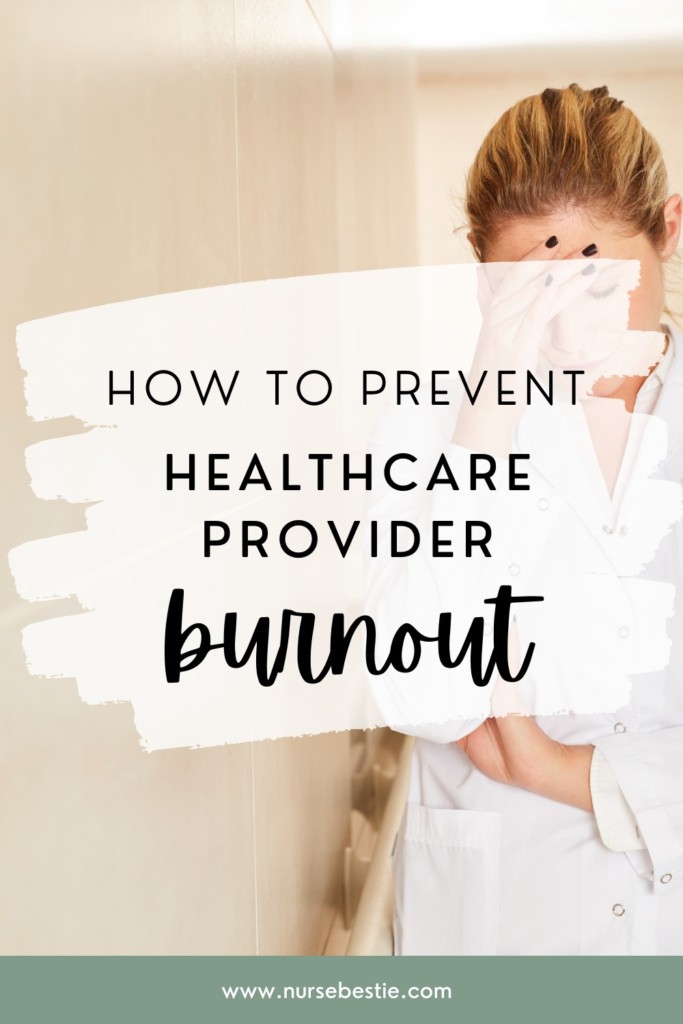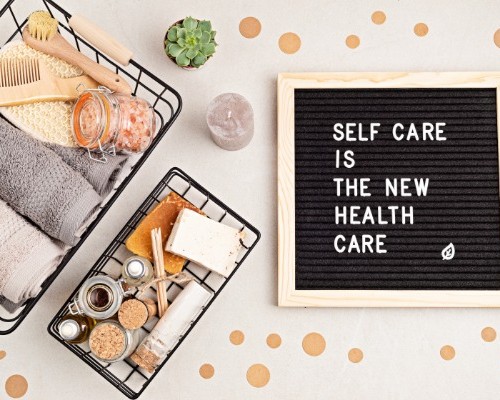If you are a healthcare provider, I’m sure you are looking for ways to prevent burnout.
Working in healthcare is very demanding. With high demands, comes a lot of stress.
The stress levels of healthcare providers are rising every day, which means more preventative strategies need to be used to avoid burnout.
The most common complaints fellow nurses have made are:
- difficult patients
- high expectations
- minimal breaks
- feeling undervalued
- not respected enough
I fully agree with all of these. I have my own experiences with each one, and they were all definite factors in my own burnout a few years back.
I emphasize that it was a few years back because I want you to know I got myself out of burnout.
I restrategized, made some major changes in my life, put my head down, and worked on myself. And you can too.
Throughout this post and my other content, you will learn how to improve your life as a healthcare provider.
It is my absolute goal to make YOU feel happier and more in control of your life whilst working in healthcare!
Related:
Why Being A Healthy Nurse Is So Important
How Nurses Can Prioritize Their Mental Health To Improve Well-being
Save this blog post for future reference!

Causes Of Burnout In Healthcare Providers

Healthcare is its own world.
Working in healthcare causes a unique type of burnout because you are dealing with so many people’s emotions and outcomes on a daily basis.
There is the pressure to do well, be a top performer, and form a good rapport with your patients.
With that being said, the pressures healthcare providers face are pretty intense and next-level.
As humans, we crack under pressure.
So healthcare providers really have to strengthen their armor, which takes hard work and dedication.
For now, let’s keep focusing on the causes of burnout because the first way to tackle a problem is to find the root cause of it.
Difficult Patients
So you may be wondering, how can I avoid difficult patients?
Well…you can’t. You can’t decline a patient just because they’re being difficult. (Harassment is different!)
But what you can do is learn how to work with them.

You have to accept that you won’t be as close to some patients as you are with others.
If they give you a hard time throughout their care with you, adjustments need to be made.
The way you talk, how often you give them attention, and your approach to things have to change.
I’m saying you have to use “Kill em with kindness” to the highest degree and err on the side of caution.
These patients are coming from a place of pain; something is bothering them in their personal lives making them a complete a**hole to you. Let them be, but you keep your head up.
High Expectations
When people are depending on you to help them with their health, you inevitably set high expectations for yourself.
It’s the nature of the beast. It’s the field we chose. It’s what we believe we need to do. “BE THE BEST!”
Of course, you want to give the best care, but remember you aren’t a superhuman.
When you’re handed more patients than you should manage and still push yourself to be the best, burnout will just be waiting for you on the other side.
You are human, which means you can only do so much. And whatever you can do is enough.
Give quality care. Take care of yourself. Get good outcomes.
Not Getting Enough Breaks

Depending on where you work, a proper break might not be routine for you.
The level of busy and unexpected outcomes varies from workplace to workplace.
Lack of a break and time to step away from your work is a huge cause of burnout.
Running on empty is basically what you’re doing, and it is affecting your health on a daily.
Feeling Undervalued and Disrespected
I still don’t know the true reason this exists in healthcare, but there is so much disrespect and unappreciation for nurses.
Living and breathing it myself breaks my heart all the time. Personally, I have felt so defeated at times when I’d feel disrespected.
I worked so hard for my degree and work so hard in my job; I’d often ask myself “Why are nurses not respected way more?”
I’d try to figure it out but I came to terms with “Because we are seen as helpers more than professionals.” And that’s what it comes down to in my opinion.
That’s why it’s so important to start changing the narrative slowly but surely.
Using our nursing voice, creating a stronger demeanor, and voicing what we stand for are desperately needed in the nursing world.
The form you have selected does not exist.
Signs Of Burnout In Healthcare
There are some very common signs of burnout amongst healthcare providers.
If you are noticing any of these signs in yourself, you may be burnt out or on the way there:
- Anxiety/panic attacks
- Dreading going to work
- Trouble sleeping
- Apathy
- Crying often
- Poor memory
- Getting sick often
- Highly irritable
- Picking fights often
And then something happens… you start to lose sight of why you went into healthcare, to begin with.
So How Can You Prevent Burnout As A Healthcare Provider?
Okay so let’s get into the meat and potatoes.
Let’s discuss healthcare burnout prevention strategies that actually work and aren’t crazy difficult to do!
1. Learn What Triggers You
Knowing your triggers is key in combatting burnout.
For me, one of my biggest triggers is a lack of clarity/guidance.
When I am expected to perform and do my work without any clarity or guidance, the stress starts to build. I first get frustrated and the stupidity of the situation, and then just angry at how no one is helping me.
Today, any time I sense something is going to be unclear or a”cross that bridge when we get to it” situation (one of my most hated phrases), I act.
I start preparing in any way I could, I make simple guidelines or things that will help me in those situations.
Just something to serve as a life vest!
Learn what triggers you by looking back at times you felt most burnt out.
Was it a heavy patient load and lack of assistance? Was it colleagues who do not know how to be team players? Was it a poor partner who isn’t supportive of your work? It could be numerous things.
Once you figure out your triggers, you have to create actionable plans for each of them.
If it’s your overall workplace, well then let’s move on to the next tip.
2. Remove Yourself From The Situation

I’m not trying to promote quitting here or anything, but I am a huge believer in removing yourself from a situation that doesn’t serve you.
I’m living proof. I have worked in some awful and toxic workplaces, and when I removed myself from them, I felt like a brand new person. It honestly changed my life.
We need to realize that leaving a job is not a bad thing to do.
If you do it right with an open heart, genuineness, and cordiality, you are not doing anything bad!
Every passing day is a day you’ll never get back.
Why not do what you can to make the most of your days and live as many of them being happy?
3. Ask For Change or Help
If you are feeling alone and unsupported at work, it’s time to ask for what you need.
It’s worth a shot.
I really can’t speak for anyone, so I won’t tell you that this tip has a 100% success rate. It doesn’t.
Depending on your leader and staff, it may or may not work! But you won’t know until you try, right?
Speak to your leader or colleagues and ask them for what you need. If it’s different patients, ask. If it’s a more structured break schedule, ask. If it’s assistance in certain tasks you aren’t comfortable in, ask.
The biggest reminder I want to give you with this tip is:
Do NOT feel like you are weak or inadequate if you need to ask for help. This isn’t a race and you aren’t giving yourself long-term happiness by pushing yourself to burnout.
4. Make Time For Yourself
Of course, as the core purpose of Nurse Bestie, I am going to tell you to make. time. for. yourself.

Listen, when you organize and plan, your life is going to change for the better.
I have been exactly where you are…tired, stressed, hopeless, and just fed up. Feeling like nothing is going to help me and that I’m just doomed for life.
So believe me when I say when you start making time for yourself and doing things that are GOOD for you like:
- Moving your body
- Putting your mental health first
- Eating healthy foods
- Spending time alone
- Spending time with loved ones
- Turning off social media
- Diving into old hobbies
5. Understand Your Yes’s and No’s
When you are in burnout mode, it can feel like you are pulled in a million directions, in and out of work.
At work, you have demanding patients, colleagues, tasks.
At home, you may have a partner, kids, pets, side hustles.
Whatever your life consists of, you have to understand your yes’s and no’s. What do I mean by this?
You should learn when you should say yes to things and when you should say no to things. This applies to all aspects of your life.
When you are controlling your life in this way, it will give you a surge in confidence and dignity.
It will make you realize how in control of your life you really are, even in moments where you thought you had no choice or option.
As I said before, I’m walking proof. I am sharing all of these tips with you because I have done them all myself and reaped their benefits.
Final Thoughts…
Too many healthcare providers are dealing with burnout, especially since the pandemic hit. It has created an entirely new definition of burnout.
Diana over at Self-Care Catalyst has some great resources (and they’re FREE) to help you tackle burnout! Just like me, she is a burnout survivor and really knows how you feel.
If are in the thick of it, incorporate some if not all of these tips into your life, and watch yourself slowly peel back from the intense burnout you are currently feeling.
Burnout may dip into your life here and there in the beginning, and it’ll take years to develop a lifestyle and routine that repels it almost completely, but this is your sign that it is possible.
Better yet, it is possible for YOU.
Read More:
Why Being A Healthy Nurse Is Important
QUESTION: What do you do to manage burnout? How is it going for you?
Liked this post? Share it on Pinterest!





Leave a Reply